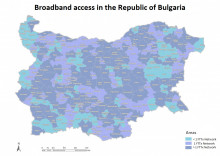Current information about the existing private and public infrastructure and the quality of the service while using a standard indicators for "mapping" a broadband networks, including about the needs of the sectors, with specific demands
Broadband is recognised by the European Commission as one of the main tools for improving of the economic and social well-being of the population. It is becoming an increasingly important factor not only for the competitiveness of the enterprises, but also for supporting social inclusion and enables the development and use of e-government services.
Bulgaria’s ranking in the Digital Economy and Society Index (DESI) for 2019 is unsatisfactory although, according to the European Commission (EC), our country has a relatively good performance in connectivity, especially in regards of the availability of very fast and mobile broadband networks. Bulgaria also has made significant progress in the development of e-government, with an increasing number of users and a wide offer of digital public services to the businesses.
The total coverage of fixed broadband networks in 2018 was 96 %, which was slightly below the EU average of 97 %, and this ranked Bulgaria on 19th place in this ranking. The spread of fixed broadband internet access is 58 %, with an EU average of 77 %, putting the country on last place in EU at this indicator. The next generation access coverage is 75 %, which ranked Bulgaria on 23th place, as the average in the EU is 83 %.The spread of ultrafast broadband is 43 %, which is higher than the EU average - 41 %, and this ranked the country on the 15th place, due to the higher performance of other Member States.
The spread of high-speed connectivity can lead to a significant increase in gross domestic product, employment, the competitiveness of national economies on the international scene and the quality of life.
Rural areas, where the private sector has less incentives to invest, remain less connected than the cities, and the number of subscribers of ultrafast broadband internet connections significantly lags behind the targets set out in the European Gigabit Society Strategy. The spread of internet and electronic services in Bulgaria is relatively good in most urban areas. In terms of internet speed in larger cities, the country is on the top in Europe. Nonetheless, in medium-sized and small towns as well as remote and sparsely populated rural areas, large teritoriesdo not have access to the internet. The impossibility of market forces to deliver broadband services in a timely manner, at affordable prices, to all citizens, irrespective of their geographical location on the territory of the country, justifies the need for State intervention in order to protect the public interest.
Under the "Rural Development Programme" 2014-2020, BGN 60 million shall be allocated, for connection to the Single Electronic Communication Network of the State administration of the municipal centres falling under the so-called "white or grey areas", according to the "Community Guidelines for the application of State aid rules in relation to rapid deployment of broadband networks" (the Guidelines).
In order to formulate correct areas and according to a measure “Updating the data on next generation broadband, which includes information on the availability and geographical location of the regional operators' infrastructure” of the National Broadband Infrastructure Plan for Next Generation Access, the Ministry of Transport, Information Technology and Communications uses information from the annual questionnaires for activity of the enteprises in 2018 of the Communications Regulation Commission (CRC).
The data was analysed according to the requirements of the European Commission (EC) and the Body of European Regulators for Electronic Communications (BEREC). The summary information was displayed using the good practices of the EC project “Mapping of fixed and mobile broadband services in Europe” (SMART 2014/0016).The interactive map that has been drawn up and the detailed information on the used methodology are available on the already functioning portal SINGLE INFORMATION POINT under sections “News” and "BB mapping" at: https://sipbg.gov.bg.
In line with EC requirements, the Ministry of Transport, Information Technology and Communications wrote and sent reasoned requests to the National regulatory authority - CRC and the Commission for Protection of Competition (CPC), concerning the preparation and implementation of a project under sub-measure 7.3 “Broadband infrastructure, including its creation, improvement and expansion, passive broadband infrastructure and measures for access to broadband infrastructure and e-government solutions” in connection with the preparation of the Information Sheet on State aid to broadband, which is available at: /sites/default/files/uploads/it/_en_aid_to_broadband_part_iii_5.doc_.pdf.
The measure meets all the compatibility principles described in the Guidelines, including objectives of common interest, existence of market failure, appropriateness and incentive effect of the measure. The implementation of the intervention is fully in line with the European Gigabit Society Strategy and would have a direct impact on Bulgaria’s ranking in the Digital Economy and Society Index (DESI).
The CRC and the CPC responded positively on the submitted information and motives for the realization of the project.
The Digital Single Market site provides a summary of broadband developments in Bulgaria and informatiion is available at the following links: https://ec.europa.eu/digital-single-market/en/informaciya-za-stranata-republika-blgariya (in Bulgarian) and https://ec.europa.eu/digital-single-market/en/country-information-bulgaria (in English).

